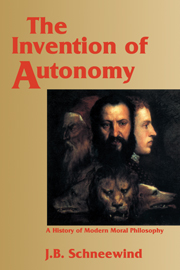Book contents
- Frontmatter
- Contents
- Preface
- Acknowledgments
- A note on references and abbreviations
- Introduction
- Part I The rise and fall of modern natural law
- 2 Natural law: From intellectualism to voluntarism
- 3 Setting religion aside: Republicanism and skepticism
- 4 Natural law restated: Suarez and Grotius
- 5 Grotianism at the limit: Hobbes
- 6 A morality of love: Cumberland
- 7 The central synthesis: Pufendorf
- 8 The collapse of modern natural law: Locke and Thomasius
- Part II Perfectionism and rationality
- Part III Toward a world on its own
- Part IV Autonomy and divine order
- Epilogue
- Bibliography
- Index of names
- Index of subjects
- Index of biblical citations
7 - The central synthesis: Pufendorf
Published online by Cambridge University Press: 05 June 2012
- Frontmatter
- Contents
- Preface
- Acknowledgments
- A note on references and abbreviations
- Introduction
- Part I The rise and fall of modern natural law
- 2 Natural law: From intellectualism to voluntarism
- 3 Setting religion aside: Republicanism and skepticism
- 4 Natural law restated: Suarez and Grotius
- 5 Grotianism at the limit: Hobbes
- 6 A morality of love: Cumberland
- 7 The central synthesis: Pufendorf
- 8 The collapse of modern natural law: Locke and Thomasius
- Part II Perfectionism and rationality
- Part III Toward a world on its own
- Part IV Autonomy and divine order
- Epilogue
- Bibliography
- Index of names
- Index of subjects
- Index of biblical citations
Summary
Samuel Pufendorf (1632–94) published his great work on natural jurisprudence in 1672, the year that Cumberland's treatise on the subject appeared. In the following year he brought out a compendium of it meant for students. Both the lengthy De Jure Naturae et Gentium and the short version, De Officio Hominis et Civis juxta Legem Naturalem, were translated into many of the European languages, reprinted innumerable times, and used as textbooks in Protestant universities on the continent and in Scotland and the American colonies. Pufendorf was treated as a major figure in eighteenth-century histories of natural law, and as late as 1798 he was given a chapter in Christian Garve's German-language account of the main systems of moral philosophy, in which Hume is not even mentioned. But in Carl Friedrich Stäudlin's pioneering Geschichte der Moralphilosophie of 1822, the first comprehensive modern treatment of the history of ethics, Pufendorf receives only a page or two, as a follower of Grotius; and that much, or less, is all that those interested in moral philosophy have gotten about him from their historians since then. Yet his theory exercised such a lasting and extensive influence on European thought about natural law that we must take it as the paradigm of the modern version of that kind of doctrine.
- Type
- Chapter
- Information
- The Invention of AutonomyA History of Modern Moral Philosophy, pp. 118 - 140Publisher: Cambridge University PressPrint publication year: 1997



